What is a robocall? A definition + how to avoid robocalls
Clone phishing is a technique that scammers use to steal your information. Our guide describes how it works, gives examples, and teaches you how to prevent it.

Have you ever picked up the phone only to be greeted by a recording on the other end?
If so, you were dealing with a robocall. Like spam texts or junk email, these annoying calls can disrupt your everyday life and even impact your cybersecurity.
These types of calls are common and are often used by both legitimate organizations and sneaky cybercriminals. They’re so common, in fact, that over 50 billion robocalls were placed in 2021 alone.
If you’re asking yourself, “What is a robocall?” then you’ve come to the right place. To learn more about different types of robocalls, what to do if you receive one, and the steps you can take to avoid them, read through this helpful guide.
What are robocalls + how do they work?
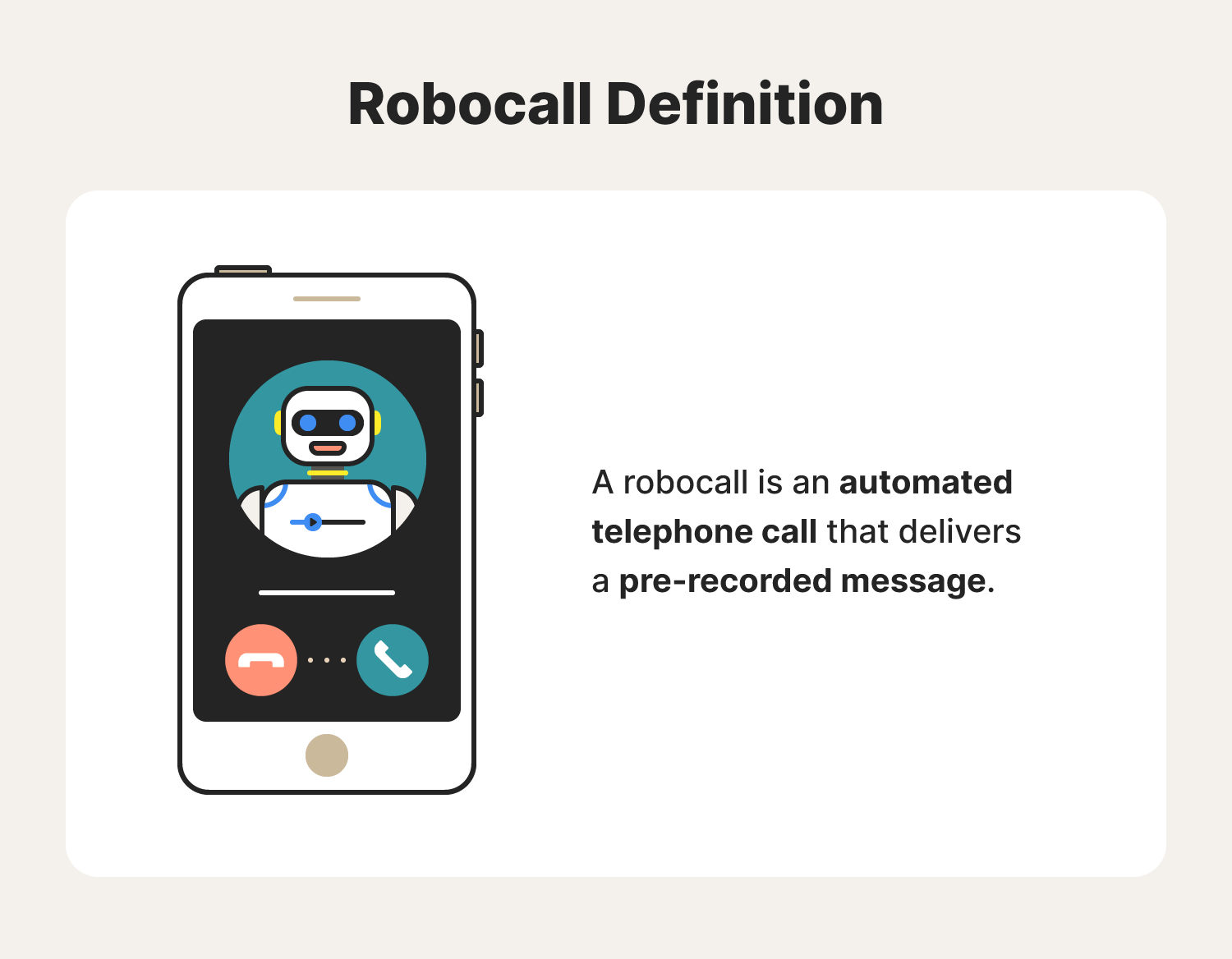
A robocall is an automated telephone call that delivers a pre-recorded message. Organizations, telemarketers, and scammers alike use robocalls to easily reach millions of phones every single day.
Robocalls are made using auto-dialing software, allowing robocallers to place calls over the internet. In some cases, robocallers may use caller ID spoofing technology to make it seem as if the phone call is coming from someone else.
This technology has enabled scammers to use robocalls for malicious purposes including vishing, identity theft, and other dangerous scams. While this is something to be aware of, not all robocalls are used for scamming purposes.
What is the purpose of robocalls + are robocalls illegal?
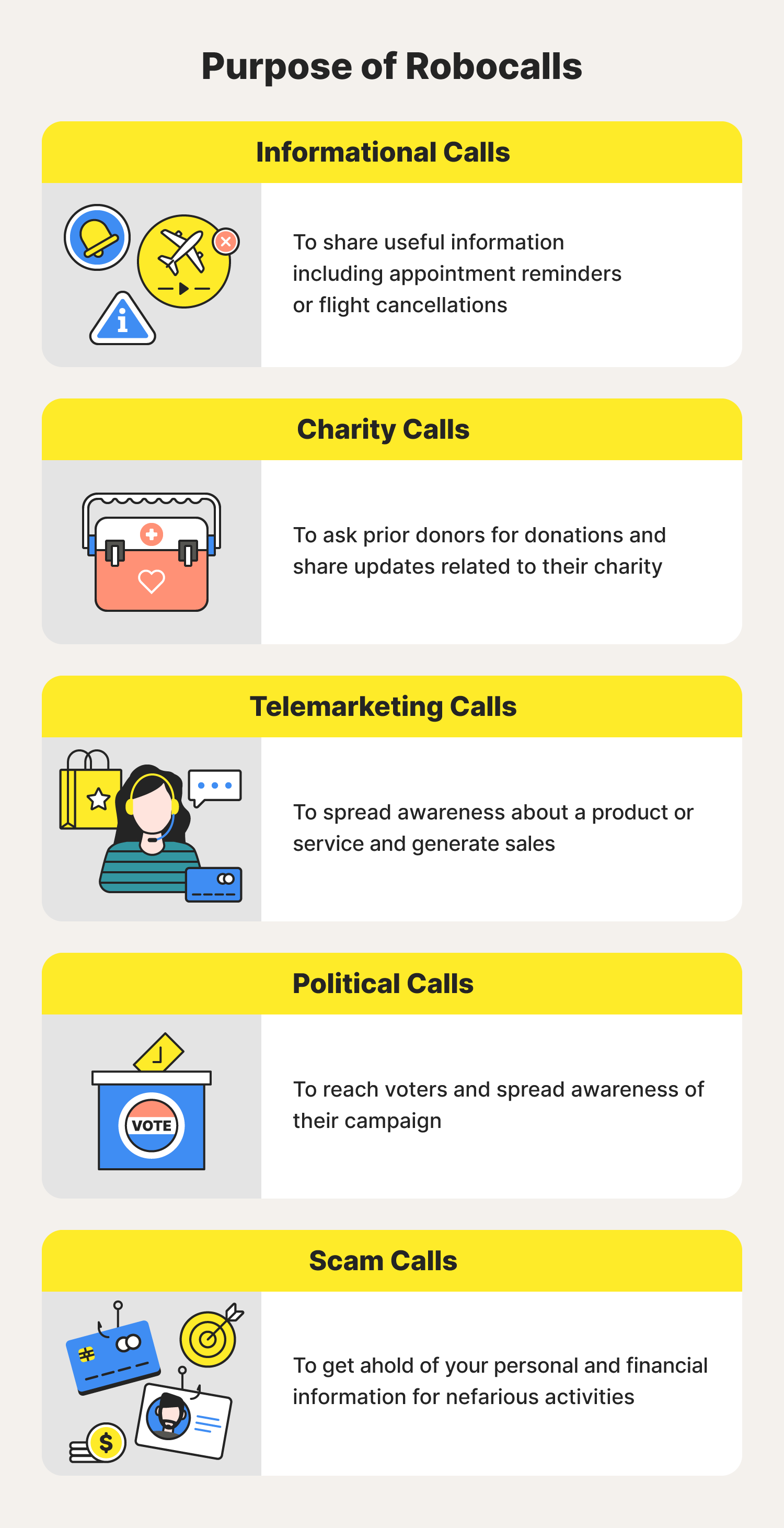
Robocalls are used by various groups for different purposes. While robocalls are an annoyance for many, there are some instances in which they are helpful. Some of the most common uses for robocalls include:
- Informational messages: These useful automated calls can deliver important information such as appointment reminders or flight cancellations.
- Charity calls: Automated calls may be used by charities to communicate with prior donors to ask for donations.
- Telemarketing: These often unsolicited calls are used to help companies generate leads and make sales.
- Political campaigns: Political candidates may use robocalls to reach voters and spread awareness about their campaign.
- Scams: Some cybercriminals use robocall services to scam people. They might pose as a legitimate company or use social engineering tactics to get ahold of your personal information.
The legality of robot phone calls depends on the specific situation. For example, informational, political, and charity calls are legal. But if a robocall is trying to sell you something, it’s considered illegal unless the company has gained your written consent beforehand.
What happens if you answer a robocall? 5 steps to take
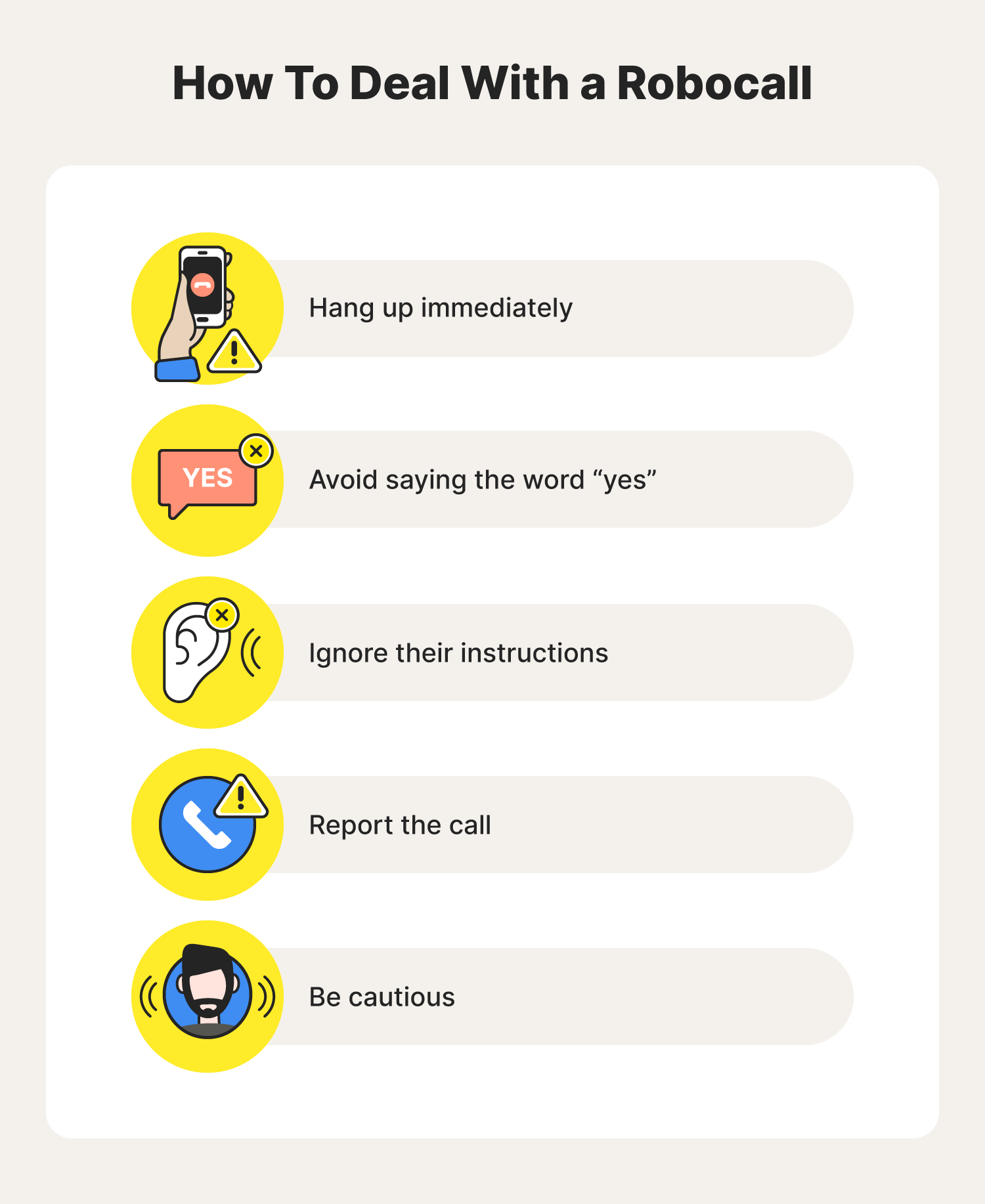
We’ve all been there before. You receive a call from an unfamiliar number and wonder whether or not you should answer. After much deliberation, you answer the phone and are greeted by a pre-recorded voice.
Now what? Follow these steps to know what you should do if you answer a robocall.
1. Hang up immediately
Hanging up as soon as you notice it’s a robocall is the best action you can take to stay safe from any potential scammers. The less you talk, the better, as holding a conversation can let robocallers know that they’ve found a live phone number.
2. Avoid saying the word “yes”
If possible, it’s best to always avoid saying the word “yes.” In many cases, scammers may record your conversation and use it to impersonate you for fraudulent activities. To bait you into saying yes, the recording may ask you a question like “Can you hear me?” Because of this, always be cautious when speaking to an unknown caller.
3. Ignore their instructions
In the same vein, you should also always avoid following their instructions. They may ask you to “press one to unsubscribe” or “press two to speak to a live customer service representative.” By following their orders, you’re informing them that you have a live number.
4. Report the call
Now that you’ve hung up, you should report the call to the Federal Trade Commission (FTC) at DoNotCall.gov. By providing the FTC with details about your call, you can help them track down whoever is behind the robocalling operation. Not only can this benefit you, but it can also benefit millions of others who could potentially be affected by these scams.
5. Be cautious
Robocalls can cause serious problems like identity theft if you give up your personal information. You should answer every phone call with caution and avoid following any orders from someone you are unsure about.
How to spot a robocall scam: 12 types of robocalls to know
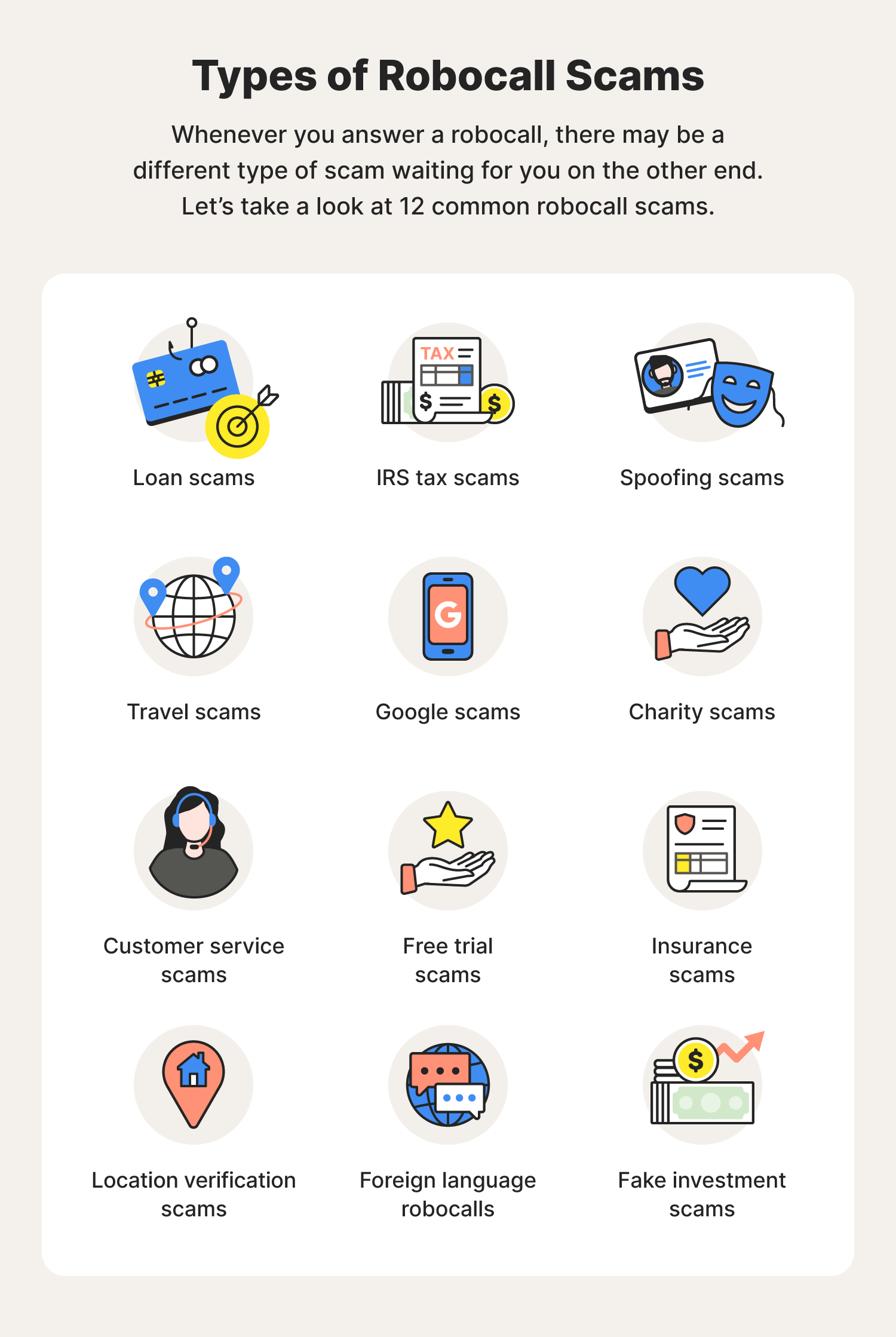
Now that you know what to do about robocalls, let’s take a look at the different types of robocall scams that are going around today. Ranging from fake investment opportunities to tax scams, these scammers have come up with plenty of clever ways to trick their victims.
1. Loan scams
In this type of scam, you may be offered a low-interest loan or credit card in exchange for a small upfront fee. Cybercriminals will target those with a poor credit history, hoping that you’ll desperately hand over your credit card information.
2. IRS tax scams
In a fake tax scam, you'll hear a recording of a person pretending to be from the Internal Revenue Service (IRS). During these fake IRS calls, you might be told that you need to pay a tax bill or that your Social Security number is in danger. Scammers use these scare tactics hoping you'll hand over your sensitive information.
3. Spoofing scams
Spoofing scams are calls that come from numbers imitating a local business. This tactic is used in hopes that recipients are more likely to answer a phone number from the area. To be safe, you can check the business’s number they have listed on their website.
4. Travel scams
In travel scams, robocallers may contact you offering a free or cheap vacation. But here's the catch — you'll need to give them your credit card information to book the trip. This scam is designed to take advantage of your excitement and trick you into handing over your hard-earned money.
5. Insurance scams
These robocallers try to steal your personal information by claiming that you can save money on your insurance by switching over to their plan. But instead of saving you money, following their orders could mean your information gets sold to third parties.
6. Charity scams
While some legitimate charities may use robocalls, some can be fake. Because of this, you should never give your credit card information over the phone. In some cases, these scams will even piggyback off current events such as a national disaster. If you fall for the scam, your donation may go directly into the scammer’s pocket.
7. Customer service scams
If you receive an unsolicited robocall from a notable company’s customer service team, it could be a scam. They might ask you to buy a warranty or verify your account details. As always, think twice before sharing any private information on the phone.
8. Free trial scams
In these scams, you may be offered a free trial for a product or service. To activate the trial, they will first ask for your credit card. If you follow through, you could get charged monthly without receiving any actual benefit. In other cases, you may have your identity stolen.
9. Foreign language robocalls
If you live in an area with lots of people who speak a foreign language, you may receive a robocall in that language. For example, let’s say you receive a call claiming to be the Chinese Embassy. In this scam, a recording in Mandarin will ask you for information to protect an immigrant’s immigration status. If you ever receive a robocall in a foreign language, it’s best to hang up immediately.
10. Location verification scams
In a location verification scam, you may be asked to confirm your business’s location so it can be updated on an online map. Like many others, this scam is designed to trick you into giving out sensitive information that a scammer can use for nefarious activities.
11. Google scams
Like a location verification scam, these robocalls also target small businesses. Instead of claiming to call about an online map listing, they will say they work for Google. In some cases, they will say that your website listing is about to disappear, and they need more information to ensure it stays on their site.
12. Fake investment scams
In a fake investment scam, a robocaller will inform you about an exciting investment opportunity that’s bound to make you rich. The only catch is that they need your credit card information so you can invest. Before reaching for your wallet, remember that these are only attempts to steal your personal and financial information.
While there is no easy fix to stop every type of robocall, there are prevention measures you can take to help protect yourself.
How to prevent robocalls: 9 protection tips
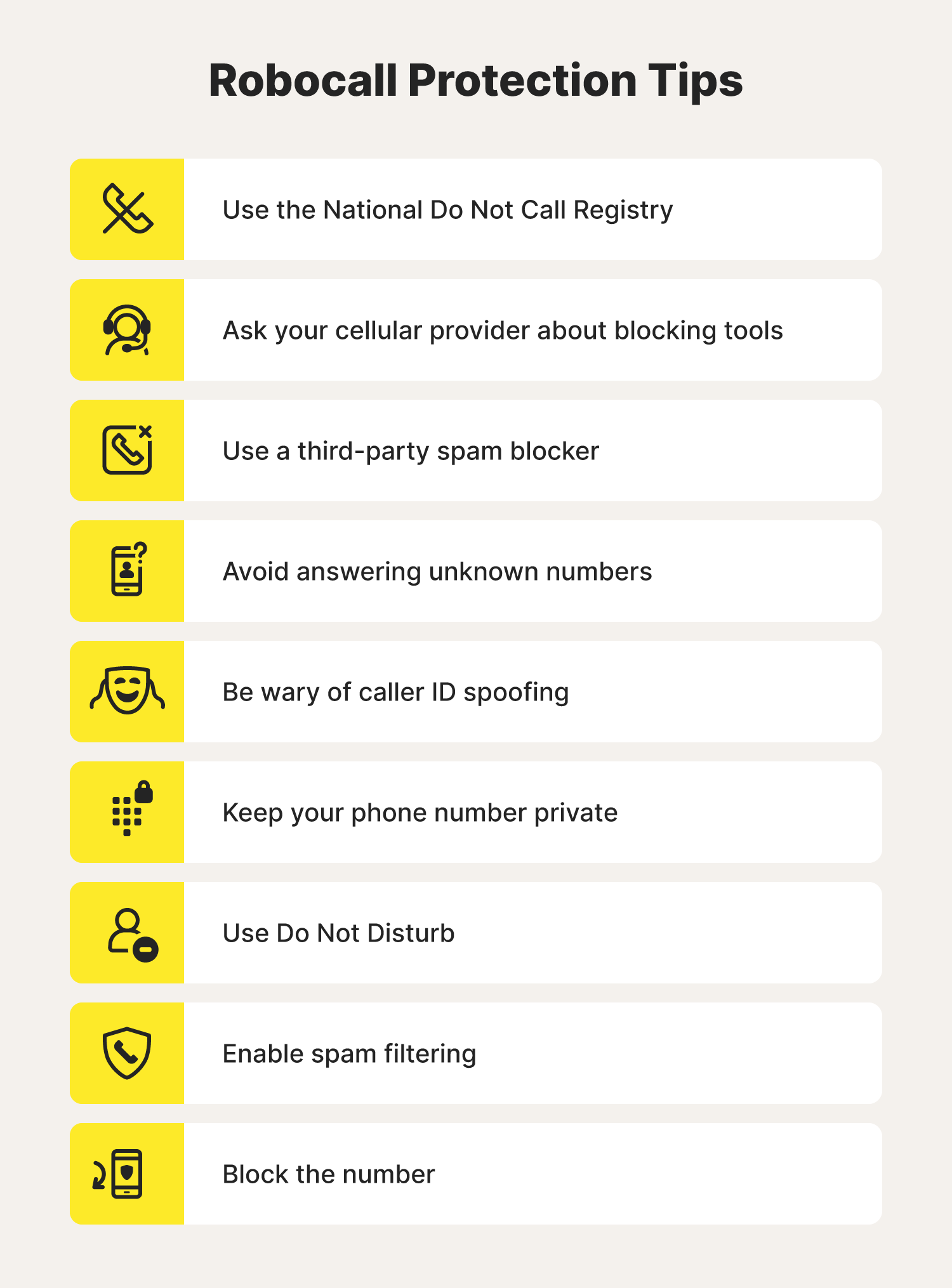
With so many types of robocalls circulating the airwaves, you might be wondering how you can avoid them altogether. Check out the following tips to help prevent your phone from blowing up with robocalls:
- Use the National Do Not Call Registry: To help protect your phone from annoying robocalls, you can add your number to the National Do Not Call Registry. This can help prevent any legal robocallers from reaching you.
- Ask your cellular provider about blocking tools: Many cellular providers have call-blocking technology available to their users. Some of these options may be free, while others may cost money. To learn more, reach out to your cellular provider for details.
- Use a third-party spam blocker: Check your phone’s official app store for applications that can help block any unwanted calls or texts. To be safe, be sure you avoid downloading anything from a third-party app store.
- Avoid answering unknown numbers: One of the best safety measures you can take is to avoid answering unknown callers altogether. That way, you can avoid accidentally sharing something private or falling for their elaborate tricks.
- Be wary of caller ID spoofing: Spoofing technology can allow scammers to fake a robocaller's name and number. If you’re suspicious about a caller, let the call go to voicemail to see if it’s legitimate.
- Keep your phone number private: To decrease the chances that your phone number is found by robocallers, only share your phone number with trusted individuals and businesses.
- Use Do Not Disturb: Most smartphones have a Do Not Disturb function that you can enable to avoid being bothered by unwanted calls. By activating this feature, you won’t have to worry about robocallers disrupting your day.
- Enable spam filtering: Some smartphones may include a built-in spam filtering function that can be enabled in your phone settings. This can help filter out unwanted calls.
- Block the number: A great way to stop getting annoying calls is to block the robocaller's phone number. This will ensure that the same phone number is unable to bother you again.
By using these tips, you can help decrease the number of robocalls you experience. For the robocalls that make it through the cracks, the best next step is to report them.
How to report robocalls
Even after taking the proper steps to prevent robocalls, some may still make it to your phone. If that happens, it’s always a good idea to report the caller. You can do this through the National Do Not Call Registry.
If you believe you’ve experienced fraud, you may also report the incident to ReportFraud.ftc.gov or by calling 1-877-FTC-HELP (382-4357).
Now that you can easily answer the question “What is a robocall?” and know the steps to avoid one, you may want to strengthen your phone security even more. To do so, try spring cleaning your phone and staying up to date on mobile scams to help you stay Cyber Safe.
FAQs about robocalls
To help finish things off, let’s dive into the answers to some common questions about robocalls.
What is a robocaller?
A robocaller is the individual or organization that is using robocalling technology to make phone calls.
What happens if you answer a robocall but don't say anything?
While staying silent after answering a robocall is better than speaking, it may still let the robocaller know that your phone number is active. This may mean you end up receiving more robocalls in the future.
What is a robocall warning?
A robocall warning is an indication from your phone that you might be receiving a scam call. You will see these robocaller warnings where the contact name or phone number would usually be displayed when receiving a call.
While the exact warning may vary depending on your phone, here are some common examples
- Scam Likely
- Potential Spam
- Suspected Spam
- Spam or Fraud
- Potential Fraud
- Spam Risk
If you ever see one of these warnings, be sure to decline and block the caller.
Where do robocalls come from?
Robocalls can come from all over the world. There is no specific place where robocalls come from, and people can use them for a variety of reasons — both legal and illegal.
What happens if you call back a spam number?
If you call back a spam number, you’re letting the caller know that you are willing to talk. This is a bad idea and may lead robocallers to continue targeting you in the future.
Why do I get so many robocalls?
If you are frequently getting robocalls, your number is likely not placed on the National Do Not Call Registry. To decrease the number of robocalls you receive, be sure to add your number to the list. It’s also important to note that this will not stop illegal robocallers, as they don’t care if your number is on the list or not.
Is it bad to answer spam calls?
Yes, it is bad to answer spam calls. Not only will answering a spam call let robocallers know that your phone number is active, but also it could leave you vulnerable to serious consequences such as identity theft.

Cyber threats have evolved, and so have we.
Norton 360™ with LifeLock™, all-in-one, comprehensive protection against viruses, malware, identity theft, online tracking and much, much more.
Try Norton 360 with Lifelock.
Editorial note: Our articles provide educational information for you. Our offerings may not cover or protect against every type of crime, fraud, or threat we write about. Our goal is to increase awareness about Cyber Safety. Please review complete Terms during enrollment or setup. Remember that no one can prevent all identity theft or cybercrime, and that LifeLock does not monitor all transactions at all businesses. The Norton and LifeLock brands are part of Gen Digital Inc.

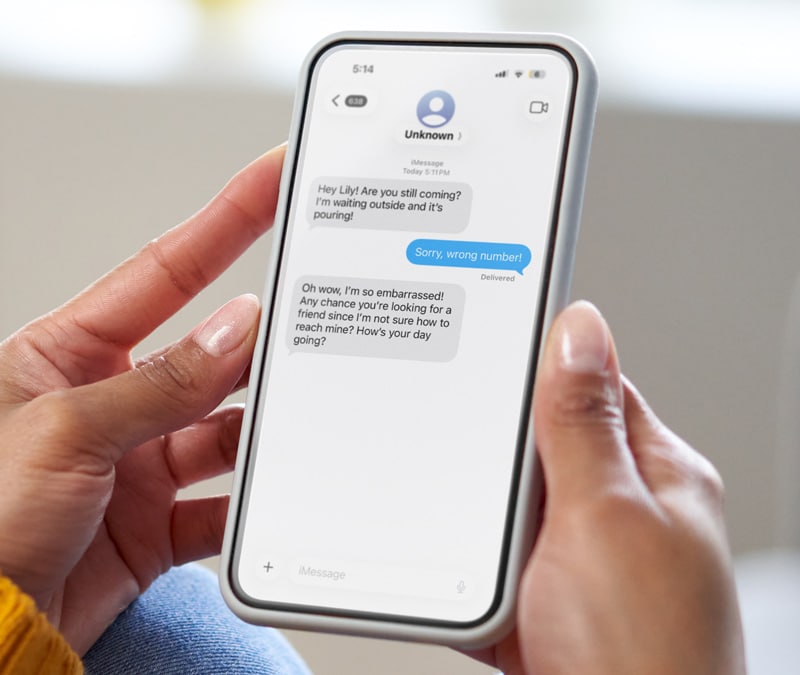



Want more?
Follow us for all the latest news, tips, and updates.